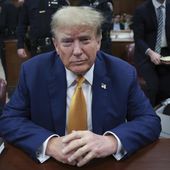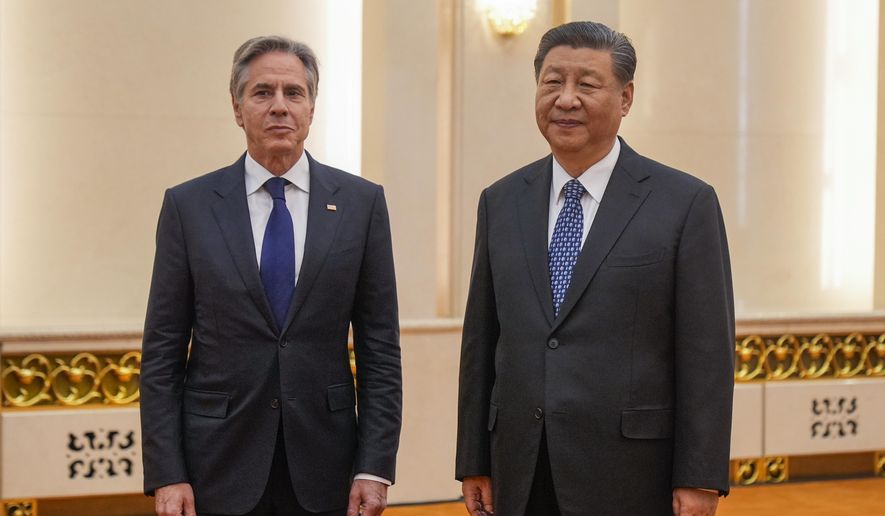OPINION:
A version of this story appeared in the daily Threat Status newsletter from The Washington Times. Click here to receive Threat Status delivered directly to your inbox each weekday.
Secretary of State Antony Blinken’s recent meetings in Beijing with Chinese President Xi Jinping and Foreign Minister Wang Yi permitted both countries to again recite their list of concerns affecting bilateral relations: Taiwan, the Indo-Pacific region, South China Sea, Ukraine and China’s support to Russia, intellectual property theft, fentanyl, military-to-military communications, semiconductors, a level playing field for U.S. companies in China, etc.
Seldom do we hear cyber and disinformation.
In an interview in Beijing on April 26 with CNN, and in answer to a question about Mr. Xi’s commitment to President Biden last year, Mr. Blinken said: “We have seen, generally speaking, evidence of attempts to influence and arguably interfere, and we want to make sure that’s cut off as quickly as possible. Any interference by China in our election is something that we’re looking very carefully at and is totally unacceptable to us, so I wanted to make sure that they heard that message again.”
Interfering in our — or any country’s — election should be a bright red line that no country dares to cross.
The former Soviet Union and now Russia wrote the book — “Active Measures” — on political warfare and the use of covert political operations, to include the use of disinformation operations, to confuse and disrupt an adversary’s form of governance. Indeed, Russia tried to spread disinformation on social media during the 2016 and 2020 presidential campaigns to polarize the electorate, create distrust and paralyze the electoral process. And in March, the U.S. intelligence community publicly assessed that Russia, China and Iran are capable of and willing to launch cyberattacks seeking to disrupt our presidential election come November.
These developments are concerning but not surprising. Bad actors will exploit any vulnerability to harm our — and others’ — form of democratic governance.
The global community had an opportunity over a decade ago to establish protocols for the peaceful use of cyberspace, a man-made domain of technological commerce and communications with over 5 billion users, traveling across a network owned by an array of businesses, with over 30,000 internet service providers that carry data around the world.
This unique cyber domain, affecting the global community, has no operative international protocols and enforcement procedures to hold countries accountable for when they or citizens in their country use the internet for criminal, terrorist or warfare purposes. The U.N. 18th Internet Governance Forum in Kyoto, Japan, last October concluded with a call for collective action to ensure that the immense volume of data generated by digital technology can be used for the common good, envisioning digital governance critical for economic, social and environmental development.
On Jan. 1, Italy assumed the presidency of the Group of Seven (G7) — Italy, Canada, France, Germany, Japan, the United Kingdom and the United States, with the European Union participating. The Leaders’ Summit, scheduled for June 13-15 in Apulia, will focus on protecting the rules-based international system, Russia’s war of aggression in Ukraine, conflict in the Middle East, engagement with Africa, and particular attention to the Indo-Pacific region. Climate change and food scarcity will also be discussed.
Artificial intelligence will be a principal subject for discussion, given that this technology can generate great opportunities and enormous risks, affecting myriad geopolitical issues. Discussions will focus on developing governance mechanisms to ensure that AI remains human-centered and human-controlled.
It was the G7 summit in Hiroshima, Japan, last May that established the first international framework for a code of conduct aimed at promoting safe, secure and trustworthy AI systems. The goal was an inclusive global governance on AI for the common good of the world. Governments beyond the G7 will be encouraged to support this initiative, to enable people around the world to benefit from safe, secure and trustworthy AI.
Given Mr. Blinken’s recent visit to Beijing and the positive Biden-Xi summit last November, the G7 should solicit China for its support and willingness to participate in the Hiroshima AI Process. This would be a timely and well-received message from China to the U.S. and the global community.
• Joseph R. DeTrani served as special envoy for the Six-Party Talks with North Korea from 2003 to 2006 and as director of the National Counterproliferation Center. The views expressed here are the author’s and not those of any government agency or department.




Please read our comment policy before commenting.